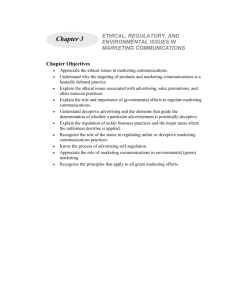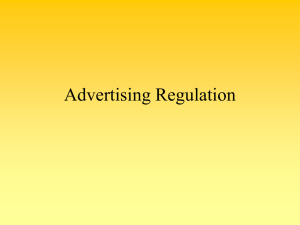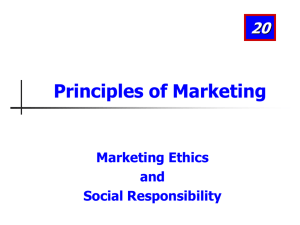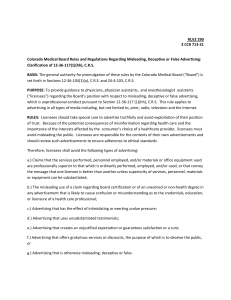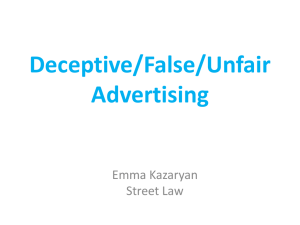Social Criticisms of Marketing: Lecture Notes
advertisement
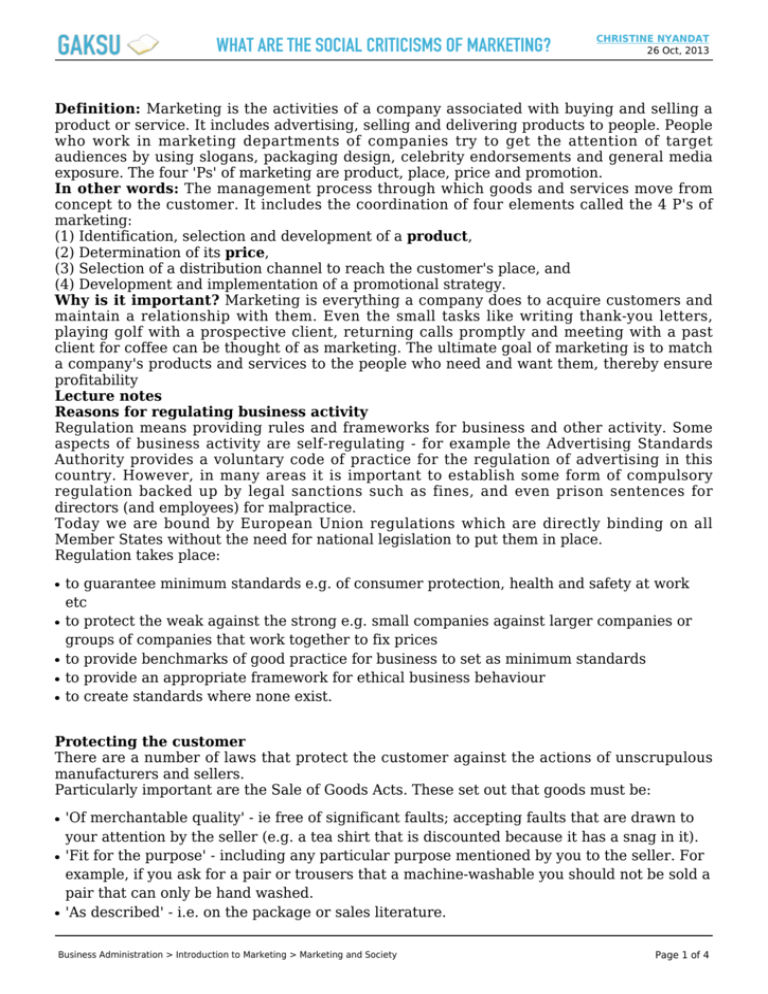
WHAT ARE THE SOCIAL CRITICISMS OF MARKETING? CHRISTINE NYANDAT 26 Oct, 2013 Definition: Marketing is the activities of a company associated with buying and selling a product or service. It includes advertising, selling and delivering products to people. People who work in marketing departments of companies try to get the attention of target audiences by using slogans, packaging design, celebrity endorsements and general media exposure. The four 'Ps' of marketing are product, place, price and promotion. In other words: The management process through which goods and services move from concept to the customer. It includes the coordination of four elements called the 4 P's of marketing: (1) Identification, selection and development of a product, (2) Determination of its price, (3) Selection of a distribution channel to reach the customer's place, and (4) Development and implementation of a promotional strategy. Why is it important? Marketing is everything a company does to acquire customers and maintain a relationship with them. Even the small tasks like writing thank-you letters, playing golf with a prospective client, returning calls promptly and meeting with a past client for coffee can be thought of as marketing. The ultimate goal of marketing is to match a company's products and services to the people who need and want them, thereby ensure profitability Lecture notes Reasons for regulating business activity Regulation means providing rules and frameworks for business and other activity. Some aspects of business activity are self-regulating - for example the Advertising Standards Authority provides a voluntary code of practice for the regulation of advertising in this country. However, in many areas it is important to establish some form of compulsory regulation backed up by legal sanctions such as fines, and even prison sentences for directors (and employees) for malpractice. Today we are bound by European Union regulations which are directly binding on all Member States without the need for national legislation to put them in place. Regulation takes place: ● ● ● ● ● to guarantee minimum standards e.g. of consumer protection, health and safety at work etc to protect the weak against the strong e.g. small companies against larger companies or groups of companies that work together to fix prices to provide benchmarks of good practice for business to set as minimum standards to provide an appropriate framework for ethical business behaviour to create standards where none exist. Protecting the customer There are a number of laws that protect the customer against the actions of unscrupulous manufacturers and sellers. Particularly important are the Sale of Goods Acts. These set out that goods must be: ● ● ● 'Of merchantable quality' - ie free of significant faults; accepting faults that are drawn to your attention by the seller (e.g. a tea shirt that is discounted because it has a snag in it). 'Fit for the purpose' - including any particular purpose mentioned by you to the seller. For example, if you ask for a pair or trousers that a machine-washable you should not be sold a pair that can only be hand washed. 'As described' - i.e. on the package or sales literature. Business Administration > Introduction to Marketing > Marketing and Society Page 1 of 4 WHAT ARE THE SOCIAL CRITICISMS OF MARKETING? CHRISTINE NYANDAT 26 Oct, 2013 Any good that you buy from any sort of trader should meet these basic requirements. Customers are also protected when buying a service. When you pay for a service (for example from a travel agent, or washing machine repairer) you are entitled to certain standards. A service should be carried out: ● ● ● 'With reasonable care and skill'. The job should be done to a proper standard of workmanship. For example, if you have your central heating system serviced then you would expect it to function properly rather than break down the next day. 'Within a reasonable time'. If you have to have your central heating system that has just been installed repaired. You would expect the repair to take place fairly promptly. 'At a reasonable charge, if no price has been fixed in advance'. There are other consumer laws governing the way in which goods and services are described in advertising. There are others which concern Food Safety (what sorts of ingredients should go into food) and Toy Safety. The Weights and Measures Act also seeks to ensure that you get fair weights of materials supplied and the measures that you expect e.g. in fluids. Consumer protection Consumer protection is the process of defending consumers against unscrupulous practices by producers and sellers. Over time, case law in this country has developed to provide consumers with a range of protections, although the best protection is the common sense of an individual consumer. There are a number of laws to protect consumers including: The Sale of Goods Act Sets out that goods must be: ● ● ● 'of satisfactory quality' 'fit for the purpose' for which they are intended 'as described' by the seller. The Trades Descriptions Act Sets out that goods must be as described. The description provides part of the contract between the buyer and seller. The Weights and Measures Act Sets out to make sure that consumers get the weight or measure (e.g. for liquids) that they are offered. The Consumer Protection Act Provides for liability for damage by defective products. The Trading Standards Department of your local authority has powers to investigate complaints. Environmental Health Inspectors check on a range of premises including those where food is prepared. Consumer protection There are a number of bodies that have been set up to protect consumers. For example, the British Standards Institute (BSI) establishes a range of standards for products and processes. Products that comply with these standards are able to display the 'Kitemark' of the BSI, which is a mark of quality. Another well known body that protects consumers is The Consumers' Association which produces the magazine 'Which?'. The Consumers' Association, like the BSI, carry out tests on a range of products, and publish the results Business Administration > Introduction to Marketing > Marketing and Society Page 2 of 4 WHAT ARE THE SOCIAL CRITICISMS OF MARKETING? CHRISTINE NYANDAT 26 Oct, 2013 showing best buys and value for money from a range of products. Marketing and the law Marketing is designed to achieve profitable sales. It involves the use of powerful tools to manipulate the decisions of individuals and of other firms in the private and public sectors. This means that boundaries must be set to define the limits of acceptable behaviour. Some limitations are imposed on a voluntary basis by firms themselves and by industrybased organisations such as the Advertising Standards Authority. But the law must provide the ultimate source of regulation in areas such as: ● ● ● ● consumer protection: laws regulating product safety, honesty in product description and rights to refunds and exchanges credit : laws requiring lenders to provide full information about a loan including the Annual Percentage Rate (APR); also giving time for borrowers to change their minds information: obligation to disclose information held about consumers child protection: age limits for the sale of alcohol and tobacco products; film certification. Overall the law has to find a balance between the importance of profitable business enterprise and the need to protect consumers from unfair or anti-social marketing activity. In the recent past,there have been a lot of criticism concerning marketing efforts of different companies.These criticism arise as a result of many companies neglecting ethical issues in marketing.These criticism are discussed below: Marketing’s Impact on Individual Consumers High Cost of Distribution Complaint: Intermediaries mark up prices beyond their value due to inefficiencies and unnecessary or duplicative services Response: Markups reflect the cost of the services that consumers expect • Convenience • Larger stores and assortments • More service • Return privileges High Advertising and Promotion costs Complaint: Prices are inflated to absorb advertising and sales promotion costs, and packaging only adds to the psychological, not functional, value of the product Response: Advertising does add to product cost but also to product value by informing potential customers of the availability and merits of the product Excessive Markups Complaint: Companies mark up products excessively Response: Most businesses try to deal fairly with consumers because they want to build relationships and repeat business Deceptive Practices Complaint: Companies use deceptive practices that lead customers to believe they will get more value than they actually do. These practices fall into three categories: • Deceptive pricing • Deceptive promotion Business Administration > Introduction to Marketing > Marketing and Society Page 3 of 4 WHAT ARE THE SOCIAL CRITICISMS OF MARKETING? CHRISTINE NYANDAT 26 Oct, 2013 • Deceptive packaging • Deceptive pricing includes practices such as falsely advertising “factory” or “wholesale” prices or a large price reduction from a phony high retail list price • Deceptive promotion includes practices such as misrepresenting the product’s features or performance or luring the customer to the store for a bargain that is out of stock • Deceptive packaging includes exaggerating packaging contents through subtle design, using misleading labeling or describing size in misleading terms Deceptive Practices Legislation to protect consumers from deceptive practices • Wheeler-Lea Act—gives the Federal Trade Commission (FTC) power to regulate “unfair or deceptive acts or practices” Is it deception or alluring or puffery that is just an exaggeration for effect? • Products that are harmful • Products that provide little benefit • Products that are not made well High-Pressure Selling Complaint: Salespeople use high-pressure selling that persuades people to buy goods they had no intention of buying Response: Most selling involves building long-term relationships and valued customers. High pressure or deceptive selling can damage these relationships. Marketing’s Impact on Society as a Whole False Wants and Too Much Materialism Complaint: The marketing system urges too much interest in material possessions. People are judged by what they own rather than who they are, creating false wants that benefit industry more than they benefit consumers. Response: People do have strong defenses against advertising other marketing tools. Marketers are most effective when they appeal to existing wants rather than creating new ones. The high failure rate of new products shows that companies cannot control demand. Too Few Social Goods Complaint: Businesses oversell private goods at the expense of public goods and require more public goods to support them. Response: There needs to be a balance between private and public goods • Producers should bear full social costs of their operations • Consumers should pay the social costs of their purchases Marketing’s Impact on Other Businesses • Acquisition of competitors can sometimes be good for society when the acquiring company gains economies of scale that lead to lower prices • Marketing practices can also bar new competitors from entering an industry and can create use patents, heavy promotional spending to drive out existing competitors • Unfair competitive marketing practices such as setting prices below cost, threatening to cut off business with suppliers, or discouraging the buying of a competitor’s product can hurt or destroy other firms Business Administration > Introduction to Marketing > Marketing and Society Page 4 of 4
